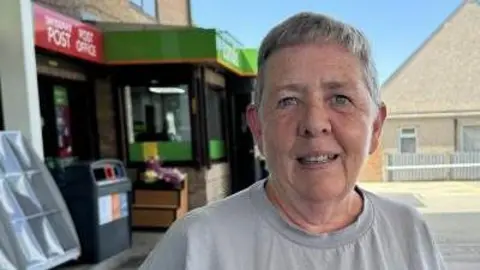Businesses struggle with rising fuel costs
 BBC
BBCFor mobile hairdresser Eleni Lewis, fuel costs are always at the forefront of her mind when planning jobs.
The 28-year-old from Pontyates in Carmarthenshire said her £200 a month fuel spend affects the business.
“I try to keep my workload in the same area as much as possible to avoid spending too much on the road using fuel,” she said.
Although average prices in Wales are currently lower than the UK level, they are higher than Northern Ireland which consistently has some of the cheapest fuel prices in the UK.
The motoring organisation, the RAC, said the example of Northern Ireland shows that fuel “can be sold cheaper than it is”.
But the body representing fuel retailers said its members were facing higher operating costs as well as investing in new technology for electric vehicles.
Ms Lewis said she keeps an eye on the changing prices at petrol stations in her area.
“There are two local to me that seem to be quite competitive with price so I try and go with the cheapest.”
Average prices in Wales in the week beginning 17 June were 144p per litre for petrol and 148p for diesel, but the RAC said that in Northern Ireland prices were about 141p for petrol and 142p for diesel.
Simon Williams, Head of Policy at the RAC, said: “We just cannot understand, when everyone pays the same wholesale price, why drivers aren’t paying prices nearer to those in Northern Ireland.”
Mr Williams pointed out that there were more independent forecourts in Northern Ireland than the other nations of the UK.
“There seems to be far better competition among independent retailers and other retailers and this is what leads to cheaper prices.”
The competition regulator recently said it was “particularly concerned” that persistently high margins – the difference between the wholesale price retailers pay for fuel and the higher price at which they sell it to customers – suggested “weakened competition and are not a good sign for drivers”.
Some customers at a garage near Caernarfon said they get reasonable prices there.
Steven Pugh travels from Llanrwst to fill up.
“I visit my sister and fill up because it’s cheaper here than anywhere else, so I do all my refuelling now instead of over that side.”
Yvonne Rowlands-Jones said high prices were particularly hard on those in rural communities.
“The price of petrol and diesel has just gone up and up, especially when you’re living out in the countryside and you have to go into Caernarfon or Bangor to do your shopping,” she said.

But Moira from Beddgelert said prices were “ridiculous”.
“It’s much cheaper in other countries,” she said.
“My brother’s just come over from Canada and I think we’re paying nearly twice what he’s paying.”
Fuel prices shot up after the invasion of Ukraine and the UK government took 5p per litre off fuel duty in March 2022, a reduction that has been extended until 2025.
But the RAC has claimed that reduction has not been passed on in full by some retailers.
Last year an investigation by the Competition and Markets Authority found that “increased supermarket fuel margins led to drivers paying an extra 6p per litre”.
It recommended a fuel finder scheme backed by a new monitoring body to enable drivers to get instant access to prices.
The UK government accepted the recommendations and they are due to come in later this year.
The Petrol Retailers Association previously said there have been “significant increases in operating costs, reduced fuel volumes post-pandemic, and the substantial investments required to transition to a low-carbon transportation system”.
“These factors mean that fuel retailers need to earn more from fuel sales to stay in business and invest in the future,” it said.
Plaid Cymru and the Liberal Democrats have called for an expansion of the Rural Fuel Duty Relief Scheme which offers price discounts to retailers which they pass on to customers in 21 areas of the UK.
Currently the scheme does not apply anywhere in Wales, but Plaid said: “Living in rural areas can cost more than living in urban areas, while services are less easily available.
“We will continue to call for the relief scheme to be doubled to 10p per litre. This is essential to ensure fairness and ambition for rural communities.”
The Liberal Democrats said “a real rescue plan” was needed to support rural communities dealing with “outrageous pump prices”.
The party is calling for a doubling of the number of areas eligible for the scheme, including some parts of Wales.
Reform said they supported expanding the Rural Fuel Duty Relief Scheme to parts of Wales and were committed to ensuring transparency and fairness in fuel pricing.
They also proposed “lowering fuel duty by 20p per litre, which will directly benefit drivers by reducing the cost at the pump.”
The Conservatives said they were committed to “delivering our Pumpwatch scheme that will force petrol retailers to share live information on their prices, boosting competition in the market and driving down prices for drivers at the pump”.
They added: “On fuel duty, our record speaks for itself, we’ve frozen fuel duty at every budget since 2010.”
Labour said: “After 14 years of Conservative chaos, motorists are crying out for change.
“A UK Labour government would tackle soaring car insurance costs by calling in the regulators to crack down on the causes of price hikes.”







